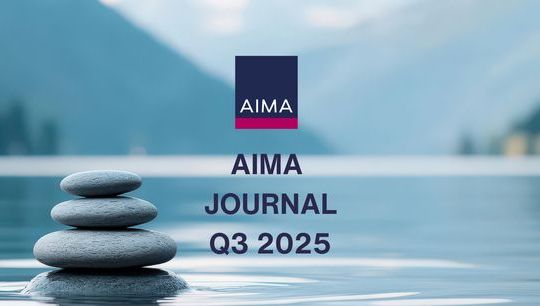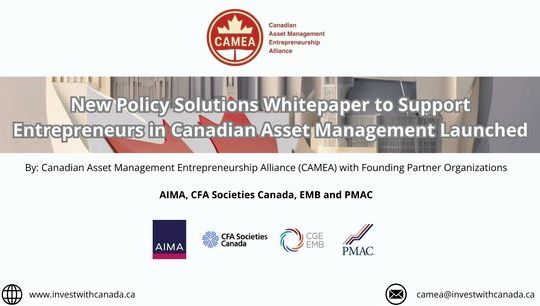Ep. 53 The Long-Short | Supporting the next generation of hedge fund managers
Published: 08 February 2023
The Long-Short is a podcast by the Alternative Investment Management Association, focusing on the very latest insights on the alternative investment industry.
Each episode will examine topical areas of interest from across the alternative investment universe with news, views and analysis delivered by AIMA’s global team, as well as a host of industry experts.
Amid higher costs, increased competition, increased regulation, and difficulties in raising capital, the environment for seeing up a hedge fund is arguably tougher than ever. What then should fledgling fund managers do?
One option being taken up is a tie-up with an established asset manager. Doing so can offer the would-be start-up the entrepreneurial freedom to manage their fund supported by the institutional benefits of a scaled business. Join us for a not to be missed episode where Teun Johnson CEO of Man GLG describes how they support the next generation of fund managers.
Additional resources:
- Teun Johnston, CEO, Man GLG
- Why start-up managers should consider an alternative route to launching (AIMA Journal, Edition 132)
Listen to this episode and subscribe on Spotify
Listen to this episode and subscribe on Apple Podcasts
Listen to this episode and subscribe on Google Podcasts
Listen to this episode and subscribe on Amazon Music
Read the transcript
Hosts: Tom Kehoe, AIMA
Guests: Teun Johnston, Man GLG
Interlude: Claire Van Wyk-Allan, AIMA
Tom Kehoe, AIMA 00:07
Welcome back to The Long-Short, I'm Tom Kehoe and Drew is out for the next number of episodes.
Amid higher costs, lower fees increased competition, not forgetting increased regulation, the environment for setting up a hedge fund is arguably tougher than ever. Fortunately, for the next generation of portfolio managers, there is help at hand. And one option that has been taken up by startup and emerging managers is to tie up with an established asset manager. In particular, asset managers that offer a multi-boutique model can often deliver the entrepreneurial freedom of a startup model with the institutional benefits of a scaled business. Doing so can allow the startup to take advantage of the larger asset managers' product development capabilities, their trading and infrastructure, as well as their administration and compliance support, essentially, leaving the operational headaches to someone else so that they can focus on what they do best, generate returns for their clients.
Teun Johnson is the CEO of Man GLG, a leading global active investment management firm, and is here to tell us more. Teun, you are very welcome to The Long-Short.
Teun Johnston, Man GLG 01:10
Good morning. Thank you for having me, Tom. I look forward to helping you shed light on some of the questions that you raised.
Tom Kehoe, AIMA 01:17
Indeed, as mentioned, at the top of this episode, the bar for setting hedge fund for setting up a hedge fund has got higher in recent years. Could you elaborate on this a little bit more?
Teun Johnston, Man GLG 01:29
Of course, I think the starting point should be that the industry over the last couple of decades has moved from one where people were just looking to access fund managers who had a skill that was differentiated. And in some instances, they were made to feel that they were lucky that they could invest with such a fund manager, whilst today, the hedge fund industry is significant in size. And, it should be very clear to all of us who operate in this industry, that we are fiduciaries for those clients. And that I think is one of the really important things for all of us in this industry to remember, we're here to manage the capital of others, and rightly so, the demands of those clients, as well as the regulators have gone up on businesses like ours. And with those increased demands, whether it's, you know, client servicing, whether it's complying with all the various edicts that come from the regulators, means that there needs to be a real infrastructure around the fund manager, and that has a cost.
And so, to be able to meet those costs, you need to have revenues against that. In our world, revenues come in the form of management fees, and performance fees. There is a minimum amount that you need to allow you to run a profitable business. Those costs are easier to meet when you have scale, as we do, at a firm like Man Group. And we always say, we have a focus where we need it, which is the fund management side, and then we have the benefit of scale in those areas, where we as a large organisation are able to gain those benefits from scale.
Tom Kehoe, AIMA 03:14
To what extent are you seeing this raised bar that you mentioned was evident amongst the smallest fund managers that you see coming through?
Teun Johnston, Man GLG 03:24
So, where you see it is, if you just look at the statistics, it is clear that for smaller funds, it takes longer to get to scale. And that makes sense because clients have the ability to choose amongst a vast array of firms and funds that may do something similar to the small boutiques that are about to launch. And it takes time for them to prove to clients that they're differentiated, potentially that they're better. And as such, the time that clients are able to take to make an investment decision is longer. I remember a period way back in 2003/2004, when supply-demand was very much in favour of a hedge fund manager, where people were looking to access new strategies earlier.
Whilst today, even for a firm, like ours, that is well established, when we launch a new strategy, those fund managers who run the strategy, need a period of time to prove to those clients that what they do is A) exceptional, and B) differentiated.
Tom Kehoe, AIMA 04:33
Yes, I recall a piece of research that we (AIMA) did last year, the Emerging Stronger paper, which looked at the startup of an emerging manager. And it did point to a lower break-even number from when we had previously done the research five years prior. But that's really only half the story, the lower breakeven we found, and breakeven, what we mean by that is the ability to cover your costs as a business, but that lower breakeven was really based on salary sacrifice and cutting back on expenses and travel which arguably is very important in trying to get a business off the ground. Working remotely, so not having an office setup, perhaps working from home. Increased the use of outsourcing and the use of regulatory hosting platforms, and we will comment on that distinction in terms of what you do versus what those services provide. As I said, it's only half the story. Man GLG offers other options for managers that want to pursue running their own money. Could you elaborate on this?
Teun Johnston, Man GLG 05:44
I think one of the things that you alluded to Tom, that is worth highlighting is, we shouldn't underestimate A) the stress of funding your own business as a startup. A decade ago, I worked at a firm where I was trying to launch a differentiated business, and in essence, I was living off my savings. and the stress that goes with that is not insignificant. And in most cases, in the small independent boutiques, it is the lead PM (Portfolio Manager), or the senior members of the team who are funding it out of their own pocket. And that is a stress.
Secondly, I would say not every fund manager, who is a brilliant fund manager is a brilliant businessman or businesswoman, it takes far more skills than just running money to get a business off the ground.
So, those two things are really important aspects to take into consideration for anybody who's thinking about launching their own hedge fund or fund management business at large, and firms like ours, you know, we provide a completely different proposition to those people who, yes, who want the freedom to invest, but B) who either don't have the ability or the willingness to fund all of those costs upfront. In essence, for someone who joins an organisation like ours, instead of funding their business out of their own pocket, they actually have the ability to earn a living in the form of a base salary when they join. But also, a firm like Man Group has a series of pooled vehicles. And, those fund managers who join us, might have access to those pooled vehicles to allow them to run a strategy to earn a living whilst they get their business off the ground.
And then another aspect over and above some of the things that you mentioned, Tom, one of the hardest things, when you launch your own business, is to actually find those early investors, the seed capital, the three or four investors who are willing to back you before you're well known. And that's really, really hard to find those investors. When you join a larger organisation that already has relationships with a vast array of clients, there may well be clients that are looking for that particular strategy, and all they have to do is make a decision on the investment calibre of the team, the strategy that they run, and the risk that they run within that strategy because they know the organisation, potentially an organisation like Man, pretty well already, the whole operational due diligence, which anyone who's launched a fund will know that it is very significant, becomes much more straightforward. And the fund manager has the ability to tap into a series of people who are very experienced in all these aspects, not just actually setting up the fund and managing the operations around it. But, also dealing with clients, understanding the requests, and the type of things that clients are looking for and helping them through that process.
Tom Kehoe, AIMA 08:56
That's very clear. And so, Teun, when you think about the funds and the firms that you would speak to that might be interested in this offering, do you have a target in mind when looking to onboard them to your platform? And is there a certain set of criteria that a particular fund must meet?
Teun Johnston, Man GLG 09:17
So, there are a whole series of things that we look for, and I think the starting point has to be, we are a commercial enterprise, and we are looking for strategies that in time, can scale. Strategies that our clients are looking for, and lastly, strategies where we believe humans continue to have an edge.
I'm extremely fortunate that I'm part of Man Group and I can see very easily what quants do well, where quants are trying to expand into and, despite that, I still believe there are areas where discretionary investors, so humans, will have an edge over computers for some time to come. All those different ingredients go into our decision-making. We're not a business that wants to have a series of strategies that do exactly the same thing, because culturally we want to be open, we want to be collaborative. So, we tend to look for things that, clients, persistently are looking for, areas where we think managers can generate alpha, and strategies, ideally, that we can scale.
Sometimes we'll do a strategy that doesn't scale that much. But, we do that because we think it'll enhance our reputation. So, at any given point in time, in essence, we're looking for really high-quality strategies that we don't already have. And for the last number of years, it's been a great time for us, there are lots of areas we could still expand into. Slowly but steadily, we've been filling, the different spots that we're looking for. But, over and above that commercial, I suppose the prism that we look at, what we really care about is that we have people who are really, really good, and ideally differentiated from the crowd. The world is quite transparent. All our clients can see how we are performing versus our peers. And so, we need to find a way that we tend towards the top of the peer group in everything that we do, it is kind of a predeterminant of success over time.
Tom Kehoe, AIMA 11:27
You talked about strategies, and do they have to be uncorrelated? Or is there another characteristic? Do you look across the board? And think about the taxonomy of the universe. Is there a particular size? Could it be that you would be interested in the smaller size fund, and then they would benefit from the infrastructure and the support that you have and be able to open doors to investors who might be interested in allocating to them?
Teun Johnston, Man GLG 11:55
I think there are various types of fund managers and fund management teams that we look to onboard. I would say, there is one group, that is those who are very well established as fund managers who operate at a competitor, and for whatever reason, there is a certain amount of push, and then hopefully we, with our business model, provide the pull into our organisation. And we've been quite successful at bringing on board that type of manager.
The other type of managers that we have been successful in onboarding, and then commercially successful, have been those that either have a small independent boutique, or they have a small, partly controlled by someone else, boutique. And, we bring them on board, sometimes we have to relaunch them from scratch. And other times, we have been able to take the fund with us. But those have been two areas in that we have been successful. And if you take the latter group, it is exactly what we're talking about today, Tom, which is people who have investment talent, because, for us, the bar is very high, yet haven't been able to scale their business because it has been difficult. With COVID, in recent years, where people haven't been able to travel to meet clients face to face, it became incrementally difficult, because there are clients who won't invest with someone unless they've met them face to face. And so, trying to run a small organisation for an extended period of time is very stressful. And when those people see the opportunity that we offer them, often it can be quite a straightforward conversation if we would like them to join us. But for us, the bar is very high.
You talked about correlation for a second, Tom. You know, we don't think about correlation, per se, when we bring a manager on board, whether it's patient indices or otherwise. But what we do know is that if we launch a strategy that is focused, let's say on the European market, European investors that invest in UCITS funds, tend to value lower drawdowns over very high returns. So, we try and set up our hedge funds. They tend to be with lower net exposure and lower correlation to asset classes, in recognition of that desire from the client base. That is something else that we bring to the party, the number of times I've had a conversation with a portfolio manager, that could be very good, but has a strategy that doesn't suit the market they sell into has meant that they haven't been commercially successful.
Claire Van Wyk-Allan, AIMA 14:48
AIMA’s Global Investor Board was created to further strengthen AIMA’s engagement with the allocator community, and better support our growing investor membership. AIMA’s Global Investor Board comprises of nearly 20 senior leaders at institutional investors from across the world, from Sydney to Toronto, California to Sweden, Abu Dhabi to Hong Kong and beyond. Chaired by Eduard van Gelderen, CIO at PSP investments in Montreal, AIMA’s Global Investor Board provides educational insights on topics such as alignment of interests, GP and LP strategic relationships, ESG, and trends impacting asset allocation, all while advancing sound practice excellence for our members and the Alternative Investment Industry. AIMA offers qualified institutional investors complimentary affiliate membership, granting allocators full access to AIMA due diligence questionnaires, operational sound practice guides, events, allocator-only peer groups and more. Full paid membership with the option to remain private is also available. To learn more about investor membership options for AIMA’s Global Investor Board work and their perspectives, please visit aima.org.
Tom Kehoe, AIMA 16:11
There may be indeed some managers, or some who may be interested in setting up a fund, listening to our conversation today, so just to get a greater understanding of the process then, a couple of questions on that Teun. How does Man GLG get new funds off the ground? And then a question I would love to get an answer to is, what makes this an attractive proposition for the portfolio manager and the firm?
Teun Johnston, Man GLG 16:44
Well, look, let me kind of take the second part of the question first, because I think we touched upon it previously.
Obviously, for us, we're a commercial enterprise, and we're looking for revenues that grow. And so each and every strategy and team that we launch is kind of a profit centre. And so, as a business, we like to diversify ourselves, just like a portfolio manager doesn't want to be too concentrated. We as a business would like to be very diversified and have lots of different strategies. And by the way, it was one of the really, really great things that the founders of GLG did all those years ago, in a period where most hedge funds were single strategy, hedge funds that were run by the founder. GLG very quickly look more like a traditional asset manager, there were lots of different funds run by different portfolio managers. And I think that is the reason that nearly 30 years on GLG is still thriving.
What is in it for a fund manager? Well, simplistically, they don't have to put their hand in their pocket to get the business off the ground. And they can still be very successful financially if they build a large business.
And lastly, we don't tell them how to run money. Yes, we have a very large and sophisticated risk management function. But those people who join us, they still get the freedom to run money the way they see fit. We might help them adjust certain things to make sure that it's commercially viable, but they still get a great deal of freedom. And they sit amongst quite a significantly sized group of really high-quality investors who they can collaborate with. So, those are the things that I think are there for a fund manager.
And then your first question, Tom, was around, how do we get a fund off the ground? For us at Man Group, this is a well-trodden path. Every year at GLG, we probably launch between five and ten funds, some of those are with teams that we've onboarded, and sometimes their launches with existing teams who are trying to expand and diversify their own business area. But importantly, if you could see the number of people that we have dedicated to getting funds off the ground, you realise that it's not a small task, and that to do it, you require expertise in a whole host of different areas, so we have quite a large legal team focused on managing funds, we have project managers who help get the legal entity off the ground, we have a treasury function that helps with prime broker relationships, counterparty relationships with banks, we have, a very significantly sized trading function that makes sure that all the trading happens. All of these things are taken care of for a fund manager. So, getting the funds off the ground, is, I wouldn't say it's straightforward, but it's something we do as part of our living every day of the week because GLG probably launched more than 10 funds in the last year alone, just to give you some sense of that.
If you really then think of the nuance of a fund manager, would a fund manager want to focus their time on investing, or would they want to focus their time on a whole series of processes, that almost certainly they will have never dealt with before.
Tom Kehoe, AIMA 20:22
Teun, you mentioned I think it was 10 funds that were onboarded last year. Is that correct in terms of this platform that we're talking about?
Teun Johnston, Man GLG 20:30
So, sorry, there's a difference between launching funds and onboarding.
Tom Kehoe, AIMA 20:35
Yeah. So, onboarding funds, how many funds have you onboarded, say, last year? And in recent years, has there been an increase in activity around that area?
Teun Johnston, Man GLG 20:48
I think the right number is six or seven teams that we onboarded. So, I think that's really the thrust of your question, teams that have joined GLG. I would say last year, probably we were busier than any year in the previous five or six, but there is a certain cadence to what we do. Now my expectation is that over time, it slows down. But there are always new areas of opportunity emerging, like one of the areas that we've been really focused on the last four or five years is to build out our presence in the credit space. I think our timing is opportune. I think with the world moving off zero interest rates, it might well be the prelude to a distress cycle. So, that represents an interesting opportunity. As the cost of debt goes up, my expectation is that we see a significant increase in the issuance of convertible debt. And there are strategies that we've launched there. But broadly, we've been really trying to build out our presence in the credit space, because we think there's a commercial opportunity there.
Tom Kehoe, AIMA 21:54
And to recall the emerging stronger report that we published last year, we noticed that startup funds are taking longer to reach US$100 million in assets under management, which we have cited as being the threshold for funds to certainly get on the radar of institutional investors. So, does being on a platform like that, that you've described, and what is provided by GLG, then give funds the best chance of attracting institutional capital, maybe perhaps before the 100 million threshold?
Teun Johnston, Man GLG 22:29
I think there are a few things that are worth highlighting, some years ago, more than a decade ago, I sat on the other side of the table. And one of the things that you would always focus on when you're looking at a new manager is, will they be around, right? Because for an investor, the last thing you want to do is to back a fund manager, and then six months later, they decide that they no longer want to fund their business as happened from time to time. And then, you don't look too great in front of your investment committee. So, clients, they're always looking to understand will this business be around.
Now, that becomes much, much easier when you look at an organisation like Man Group that is diversified, that is at scale, all the resources are in place, and the fund manager doesn't have to dip their hand into their own pocket to fund it. So, the question of the fund and the team being around six months later takes on a completely different dimension, which makes it easier to raise early capital.
I think the second component is, an organisation like Man Group has a very significantly sized and globally diverse salesforce that has lots of relationships. And, what one hopes is that by having lots of high-quality strategies, when a new team joins us, clients look upon it favourably thinking, well, these guys, they seem to be quite good at hiring people and launching strategies, if there is a new strategy in an area that I am looking for, perhaps I should look at a firm like GLG. So, the combination of relationships and hopefully, reputation, allows those managers to scale more readily, and more easily. But one should never forget that there is an extremely high correlation between early performance and early asset raising. But I think people who are in our organisation can be a little more patient, as I often say to our PMs if you perform well, and you perform well over time, money will find you eventually.
Tom Kehoe, AIMA 24:50
And as you, as you describe in the piece that you were very generous in providing to our AIMA Journal, those firms and fund managers who are able to get on with doing what they're supposed to do, which is generate returns for investors and not have to worry too much about the infrastructure headaches of managing a business, they're going to have that better chance still of attracting that investor capital, focusing on what they do best, as opposed to having to worry about a myriad of other issues with managing a business.
Teun, just to come back on the hedge fund space and the new launches in the hedge fund space. I've read recently that what was described as an all-time low, but I think, certainly the lowest level since 2008. Why do you think the environment has launches at such a low level? What also can more established players like Man GLG do to help this situation?
Teun Johnston, Man GLG 26:00
Yeah, so look, I think there is some correlation between the environment and the number of launches, I think that's one point to make, I'm sure that if you look back to 2002, you probably saw far fewer launches than you did in 1999/2000, and similarly, 2006, to 2007, and 2008. I think in 2021, you saw more launches, and perhaps there's some correlation between it being a bull market and the number of launches, just that people are more confident to do it. But, I do think that when I just sit here, and I observe, and I don't have statistics in front of me, it feels like it's just harder. And those firms that you see launch, tend to be individuals who are probably already well known to their clients, they might have been the number two, or the number three at a very large and successful firm. The clients may know them, and they're willing to back them.
But what I don't see so much of is people who one has never heard of trying it, and I'm now going back, to the mid-2000s, but it was amazing how many people you would see launch at that time. And, whilst I do believe that you are right, in your report, where you say, the costs have come down, I think the bar for clients has gone up. I think that is something that people realise. I do also believe that there are many people who previously would have considered launching their own fund and that they have decided to go and work for, what I think of as the large platforms, where they get access to a sizable pool of capital. And what we are saying to those people as well is that there is also a third way, which is, think about an organisation like ours, you don't have the stress of setting up your own business. But you do have the opportunity to launch your own fund. And if you're successful, you can do extremely well at a place like ours, and you don't necessarily have some of the risks that you might have had, certain of those competitors where you're not client-facing. So, I think it's a very interesting proposition for those who enjoy just running money and doing it.
Tom Kehoe, AIMA 28:29
And in your role as CEO of Man GLG, you will have seen many funds launch and go on and be successful and while some less so. So, is there a secret sauce that would-be hedge funds need to know about to give them the best chance of being successful?
Teun Johnston, Man GLG 28:46
So, it's an interesting one, Tom. My short answer would be, to be good, be differentiated, and never forget that you're a fiduciary. That last comment is really important. But, then there are other aspects that you should really think about like you should do when you launch any business. Is there demand for what you do? Are you differentiated? Are you good? Are you better than your peers? All of those things should play in someone's mind because they play in my mind when I speak to our investors. That's what they're thinking. And so, the bar is really high. But I think it's really important for everyone to actually just take a step back before they launch and think, does the market need what I'm offering?
Tom Kehoe, AIMA 29:34
And my final question today is, and it's been extremely helpful, and we will have in our episode notes, some information about the service that you provide for any listeners who may be interested in getting in contact with you. But my final question, just on Man Group itself, and we've read a lot about this, is the importance of technology and the influence of technology on Man Group, being a tech-enabled firm. And so, what does this then mean for the discretionary portfolio managers and GLG? And how do they make use of those quantitative capabilities that you have on offer in their investment approach?
Teun Johnston, Man GLG 30:16
Yes, I think it's a really interesting question to ask and hopefully, I will answer it in the right way, Tom. But if you take Man Group as a whole, right, we have over 570 quants and technologists. So, we have an army of people, and we can see what they're really, really good at. But what the world at large may not know, is that at GLG, we have our own quant team. And that quant is there to service, the discretionary fund managers, in essence, to help those that work for us get better. It's a team of about 10 people. And really, I think of them as doing various things, two of which I'll, I'll highlight here, Tom.
Firstly, I think in a world that is as fast-moving as ours is today, the faster we can get better information into the hands of our PMs is really, really valuable. And so, at Man Group, we have a series of data scientists and GLG’s own quant team, works with our PMs, to try and identify datasets that might help our PMs understand companies better. And then if I observe it, time and again, I see our PMs go to our quant team with a question such as what do you think the data might show for X Y Z company this quarter? Our team will then go away, and speak to our data scientists, look for the datasets, scrub them, understand whether it's relevant for the PM and if so provide the PM with that information, which is hugely valuable. And if you think about an independent business, funding that, a large one could, but a small one couldn't. So that is one thing that we do.
The other thing that we do, so, some members of our quant team are focused on helping our fund managers get better at what they do. So, they will, for every strategy, analyse a whole series of data points and datasets to try and understand what each fund manager does well, and does less well, and then work with those fund managers on trying to improve those areas where they can and that has proven to be hugely fruitful in those areas. We don't force our PMs to use that part of our quantity. But it's really interesting to watch how the take-up has over time, increased time and again, as people see the value of that aspect of what we do.
So, it's been hugely important that haven't even talked about our trading function, maybe I'll finish with that because it's quite interesting sitting next to a very large quant business. We know that the quants tend to look for smaller margins when it comes to their alpha. And therefore, the cost of trading is hugely important in determining whether a signal works or not. And so, there is a huge amount of investment that goes into trying to improve the cost of trading at Man Group. And, at GLG, we use the very same trading function, and we benefit from that. So, there are huge benefits for us as a discretionary fund manager sitting alongside a quant business. I'm so proud of what our quant team does because they help us get better every day.
Tom Kehoe, AIMA 33:42
Well, that whole evolution of tech and traditional asset management coming together is an area that we have spoken about in previous episodes that The Long-Short, but it would be great to have you back, or perhaps one of your colleagues, to go through that in greater detail. For now, many thanks for taking the time to speak to us, Teun.
Teun Johnston, Man GLG 34:03
Thank you, Tom. I really enjoyed it and look forward to seeing you again.
Tom Kehoe, AIMA 34:10
And if you want to learn more about the services that Man GLG describe in this episode, please do contact Teun to discuss with him further. His contact details appear in the show notes. AIMA also has a thriving community of emerging fund managers. Our next generation of manager group brings together senior individuals from across the alternative asset management business, that manage up to US$500 million in assets under management, to exchange ideas and focus on issues pertinent to the small and emerging fund manager community.
Disclaimer
This podcast is the sole property of the Alternative Investment Management Association (AIMA). This audio production and content are intended as indicative guidance only and are not to be taken or treated as a substitute for specific advice, whether legal advice or otherwise. AIMA permits use or sharing of the content in media or as an educational resource, provided always that proper attribution is made. The rights in the content and production, including copyright and database rights, belong to AIMA.






